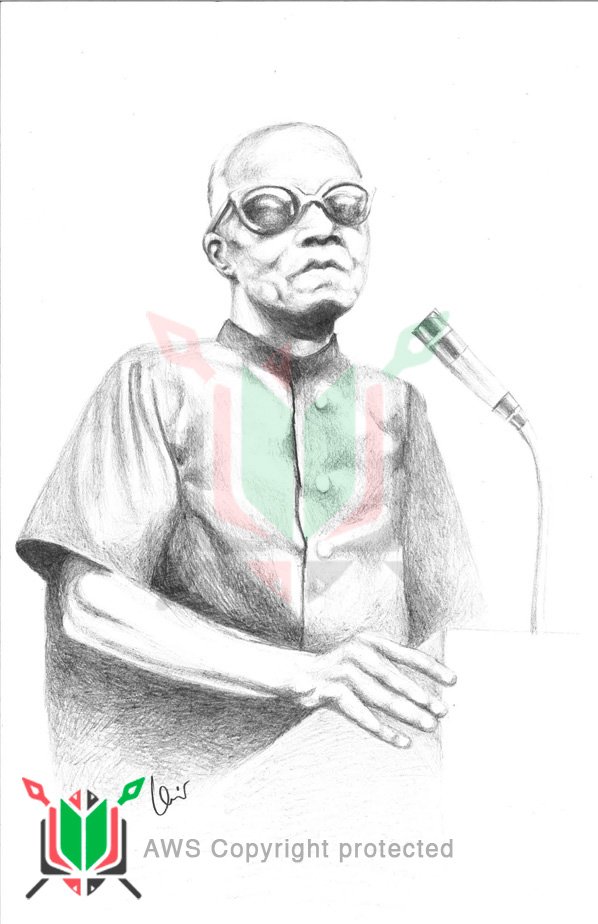
Dr. Chancellor Williams BSC; MBA; PhD (1893-1992)
Author, Philosopher, Psychologist, Socialist, Pan Africanist, Lecturer, Social Worker
Birth
Who is Chancellor Williams? He was an African American sociologist, historian and writer. Though his name may not be familiar to many, he is one of the unsung heroes of the early African American Afrocentric movement*. His book: The Destruction of Black Civilization is popularly referred to as the “blackman’s bible.”
Born on December 22, 1893 in Bennettsville, South Carolina approximately, 30 years after the proclamation of emancipation; Chancellor James Williams, although not born into slavery, legally could have been called a slave as officially slavery was not ended until the Thirteenth Amendment was ratified in December, 1893. He died on December 7,1992 at Providence Hospital, Washington DC , 15 days before his 99th birthday.
Education
Chancellor Williams may have escaped the most demeaning acts of slavery but as the son of a former slave and being born in the South, the most racist section of the country, he was exposed to the mere existentialism of the ‘black’ race. Naturally this piqued his curiosity which made him question the disparity between the standard of living of ‘colored’ people as opposed to white folks. He felt the need to understand why such a glaring socio-economic imbalance existed, being told that it was due to slavery he wanted to know how, where and why his people became enslaved. Furthering his education in South Carolina which was still deeply segregated was no easy task in the early 1900’s and posed more questions than answers to Chancellor’s racial inquisitiveness. During the Great Migration particularly of blacks out of the deep South to states that were more “favorable’ towards blacks in the immediate post emancipation era, the Williams family of seven, Chancellor being the youngest, relocated to Washington, District of Columbia (Washington DC) in 1910.

From as early as the fifth grade, Chancellor Williams began to satiate his interest in the origination of the Afro-American people by reading National Association for the Advancement of Colored People (NAACP) publications well as any other other books about Africans that he could lay his hands. In order to understand the disenfranchisement of blacks, the noticeable segregation and “white supremacy,” Chancellor developed a healthy reading habit as it pertains to black history.. To satisfy this voracious reading appetite and his thirst for ancestral knowledge, he not only read but sold The Crisis, a NAACP publication not only as a means of financing his procurement of reading material but also to assist in metastasizing literature on Black Power. Williams attended and graduated from Armstrong Technical High School and worked for a while before enrolling into Howard University which was and remains one of the greatest and most prestigious Historical Black Colleges and Universities (HBCUs) of all times on the North American continent. There he earned an Undergraduate Degree in Education in 1930 and five years later in 1935 he got a Masters’ Degree (MSED) in history. Although he had studied hard and had acquired these degrees, Chancellor Williams did not slow down. He followed up with studying and writing a paper on the socio-economic significance of “storefront churches:” for which he was awarded a doctorate (Ph.D) in Sociology from the American University in 1949.
Determined to go as far as possible in his quest for knowledge, Williams went to Europe as a visiting professor where he continued his study and research into African civilization, culture, religion and economy at institutions as the renowned Oxford University and the University of London. At this juncture, Chancellor Williams had become an international scholar on a quest of trying to discover all he could about the destruction of the African race and resources during slavery. On returning to the USA, he attended the University of Iowa, the University of Chicago and then went back overseas to the University College in Ghana where he continued field research in African history. This time however, he did not focus on slavery but on the achievements of the African people before the advent of the European and Asian cultural invasions. He was more interested in the pre-existing civilizations that existed prior to the insurgence of Europeans and East Asians, also the influence that these newcomers had on the many independent African cultures and subcultures.
Chancellor James Williams was no ordinary scholar. He was intent on exposing the devastating effect these marauders had on the African continent as a whole. This intensive study took him to 26 countries encompassing over 100 language variations to include native dialects. Dr. Chancellor James Williams could aptly be described as one of, if not the most learned African American of the early to mid twentieth century.
Career
In 1935 at the age of 45 years, Dr. Chancellor Williams was working as Administrative Principal at the Cheltenham School for Boys in Maryland. Four years later he took an active role in the classroom by becoming a public school teacher in Washington, District of Columbia, more popularly referred to as Washington DC. (Separate and far removed from Washington State) With World War 11 looming in 1941, Dr. Williams entered the civil service as part of the Federal government where he his educational capabilities were well utilized. He served as section chief of the Census Bureau, an economist in the Office of Price Administration, also as a statistician on the War Relocation Board. After WWII ended in 1945, Dr. Williams returned to his alma mater, this time not as a student but as a lecturer in the field of Social Science for six years after which he switched to the department of history. By this time he was not only lecturing but also writing on Afrocentrism. He became an advocate for social and economic change of the disenfranchised African-American people while trying to spread and influence others to embrace the concept of Afrocentrism at that time was (and even now is) a new concept which needed to be propagated, explained and accepted by all black people in the diaspora.
Afrocentrism
Afrocentrism simply put is the study of world history from an African viewpoint. Some considered the Afrocentric Movement to be a direct response by the African-American scholar to the Eurocentric attitudes of “white people” towards “blacks.” Basically, Afrocentrism is the Pan-African self-determination to ratify the biased historical publications of culture, history, philosophy, contributions to and development of world civilization of the African people externalized by Euro-centrism. Some Europeans view this concept as a political movement birthed by African-American scholars in the late nineteenth century to the early twentieth century. Although not credited by many, Dr. Chancellor Williams was one of the pioneers of this movement. His book: The Destruction of Black Civilization is the result of arguably the most comprehensive of African civilization and culture and a prime representative of Afrocentrism. Dr Amos Wilson’s book Blueprint for Black Power may have been influenced by Dr Williams’ perspective on how the African people may be regenerated, revitalized and reinstated as proposed in chapter 25 of The Destruction of Black Civilization, 1971, some 27 years before.
Books
His aforementioned studies had made him an authority on this aspect of the African people; their past superiority and the erosion thereof. He had dug deeper than all other black historians before him and had unearthed the tangible proofs that existed in writing and artifacts that the Europeans had stashed away in their museums. At last he has found answers to some of the questions neither his parents, grade five teacher or pastor could answer. For further verification, Chancellor returned to Africa where he spent two years travelling throughout the African continent talking and listening to the people, gaining information that was not documented in the history books. An integral part of the African culture was and still is “storytelling”; the art of sharing historic information by word of mouth from one generation to the next.
Evolving from childhood to young adulthood, Dr. Williams was more determined to discover where and when the seeds of segregation and the discrimination of the ethnic minorities, particularly people of African descent germinated. Subsequent to his initial research which began when he was in grade school, he discovered that whites were at one time slaves also. He wanted to know when and how the roles were reversed to the extent that the mere pigmentation of the African’ skin automatically made him inferior to white people. He had many questions as to how and why did black people find themselves in this predicament. Most pressing was his desire to learn why were Africans the only people enslaved in their country? While blacks may be the minority in North America where they were brought and forced into slavery; how did a white minority enslave blacks in a black majority country? Thinking something must be drastically wrong with this picture he ventured to Africa searching for answers. He sojourned throughout the African continent for 2 years at the end of which he had more than enough information to write two volumes of African History. However, due to time constraints and failing eyesight, he summarized his work into one book: The Destruction of Black Civilization. He explained that to write all he discovered would have taken him an additional five years which he was not sure he would have been able to dedicate himself based upon health issues he was experiencing at that time.
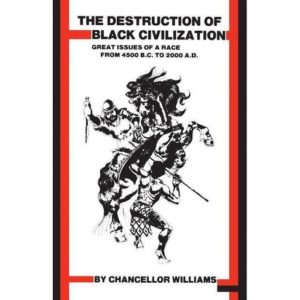
“The Destruction of Black Civilization” focused on Afrocentrism; highlighting issues that plagued black population which was a shift from the more popular themes of that era. The content of this book is so potent and relevant to the African spiritual, economical, cultural and social upliftment that it is referred by many as “the black man’s bible.” The acronym was not given based on it’d religious contents but on the profound understanding and veracity of the African people, their origins, culture, education, skills and civilization. — contents of the Most writers during this period predominantly focused on the post slavery/ emancipation era while Dr. Williams timeline spanned centuries from 4500 BC to 2000 AD. This was a massive piece of historical research which no single historian had ever attempted to include in one writing at any time. This feat by itself is historical. Although the writing may be a bit repetitious to some, Dr Williams deliberately used this writing style to emphasize or for clarification. He tried to make his writing as simplistic as possible without it becoming mundane as he wanted everyone; particularly those with basic reading skills to understand. Afterall, his work was not for the scholars as such, but mostly for the oppressed, marginalized Pan-Africans. One may ask the question: How can someone who died in the twentieth century (1992) write on issues that will affect us in the twenty-first century (2000)? Why not? How was he able to write on activities that took place centuries before? His dedication to unearth the truth through research, his personal experiences and observations coupled with an alert, astute mind gave him that authority.
Although he was mostly recognized for the aforementioned book, Chancellor Williams was the author of at least three other books, two of which were written before his masterpiece on Black Civilization: The Raven: A Novel of Edgar Allan Poe was his first attempt at writing in 1943. His next two books: And If I Were White, 1946; Have You Been to the River? 1952, classified as fictional works were not popular, thereby Williams was not recognized as a writer of any notability until he started to write about African History, a subject on which he was more than qualified to write in 1961. The Rebirth of African Civilization, 1961 was his first creditable publication in the writing fraternity after which he wrote Problems in African History 1964 and then came his masterpiece: The Destruction of Black Civilization in 1971. This cemented his place in the annals of history as one of the greatest researcher and historian of all times. So palpable was this work that it is often referred to as ‘the black man’s bible”; a book that every African should not only read but have in their homes in the same way as Christians make the Holy Bible a necessity.
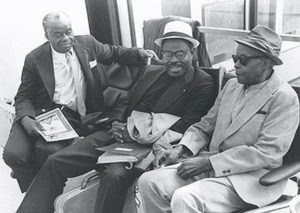
Dr Chancellor Williams spent most of his years researching the African Civilization from the timeline of 4500 B.C to 2000 A.D. Although he had this vast amount of knowledge he was unable to tangible impart all as by 1975 his sight was failing and he was only able to produce some of his work with the help of his trusted assistant Oggi.“The Rebirth of African Civilization” and “The Second Agreement with Hell” are two of his lesser known works. As an activist, he helped to introduce Afrocentrism, which, at the time, was a new concept to many.
Popular/ Famous Questions and Quotes asked and made by Dr. Chancellor Williams
“The term ‘black’ was given a rebirth by the black youth revolt. As reborn, it does not refer to the particular color of any particular person, but to the attitude of pride and devotion to the race whose homeland from times immemorial was called ‘The Land of the Blacks.’ Almost overnight our youngsters made ‘black’ coequal with ‘white’ in respectability, and challenged the anti-black Negroes to decide on which side they stood. This was no problem for many who are light or even near-white in complexion, for they themselves were among the first to proclaim with pride, ‘call me black!’ Those who hate the term but hold the majority of leadership positions feel compelled to use it to protect their leadership roles.”
This is a quote from: Destruction of Black Civilization: Great Issues of a Race From 4500 B.C. To 2000 A.D.-Dr Chancellor Williams, 1971
In other words, there can be no real identity with our heritage until we know what our heritage really is. It is all hidden in our history, but we are ignorant of that history. We have been floating alone, basking blissfully in the sunny heritage of other peoples!
― Chancellor Williams, The Destruction of Black Civilization: Great Issues of a Race from 4500 B.C. to 2000 A.D.
Simplified; it is necessary to know your origins in order to know who you are. It is impossible to identify with something or someone you know nothing about.
Dr. Chancellor James Williams-the man
Although retired and visually impaired, with the aid of his loyal assistant Oggi, Chancellor Williams remained active in his writings and research on the issues affecting African civilizations. He has received such honors and recognition as
- 1972, award from Black Academy of Arts and Letters
- 1979, first Clarence L. Holte International Biennial Prize by the Twenty-first Century Foundation
When he died of respiratory failure on December 7, 1992, 15 days before his 99th birthday, he was no longer searching for answers, instead he was searching for ways to assist Africans in the diaspora to recognize and be proud of their ethnicity. He believed that Africans and Africa could reclaim their once powerful status through the study and application of Africanism. Dr. Chancellor James Williams was survived by his wife of 65 years, Mattie Williams, 14 children, 36 grandchildren, 38 great-grandchildren, and 10 great-great-grandchildren. All the Black History scholars need to read and reflect on the following quote:
For no matter what the factual data were, all books written about blacks by the conquerors reflected the conquerors viewpoints. Dr Chancellor James Williams, Destruction of Black Civilization, 1971.
We hope that you found the information above interesting and informative. All of the content used on our website is original and created especially for the educational uplifment of our visitors. This includes our images such as the sketch you see above created exclusively for our website. Please visit our online store to purchase items commemorating the great honorable Dr. Chancellor Williams and other African Warrior Scholars. Thank you for visiting!
Abibifahodie,
The AWS Team
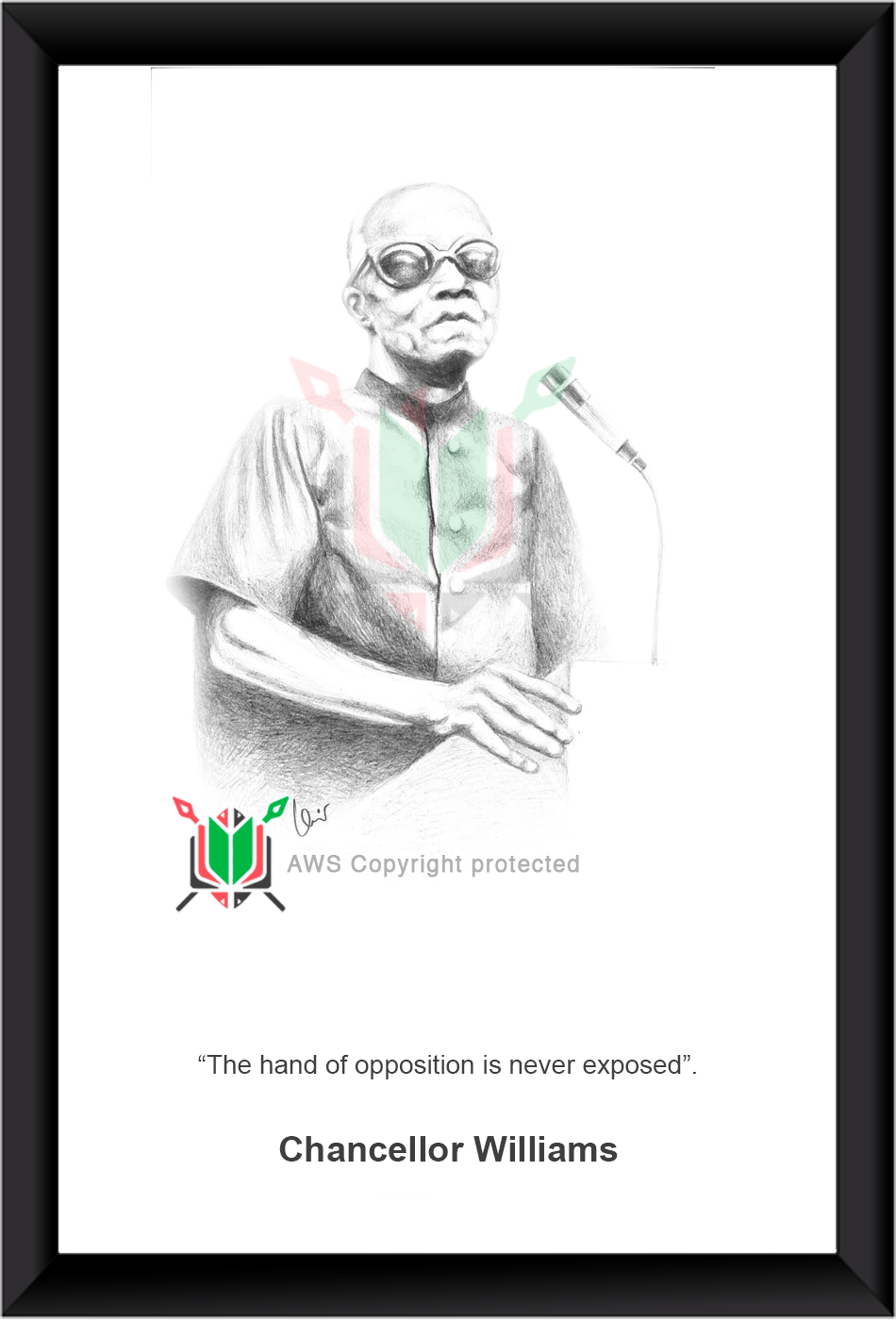
Chancellor Williams Custom Quote Sketches
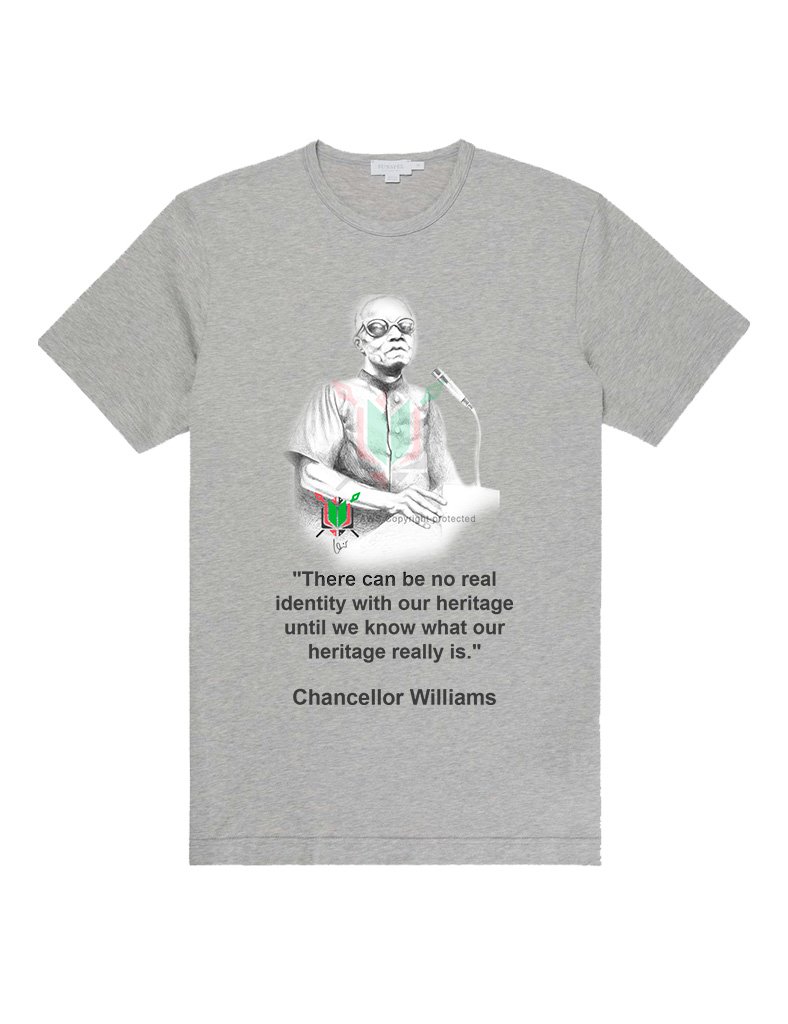
Chancellor Williams Custom Quote T-Shirts

